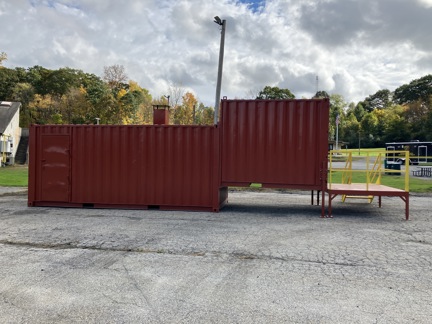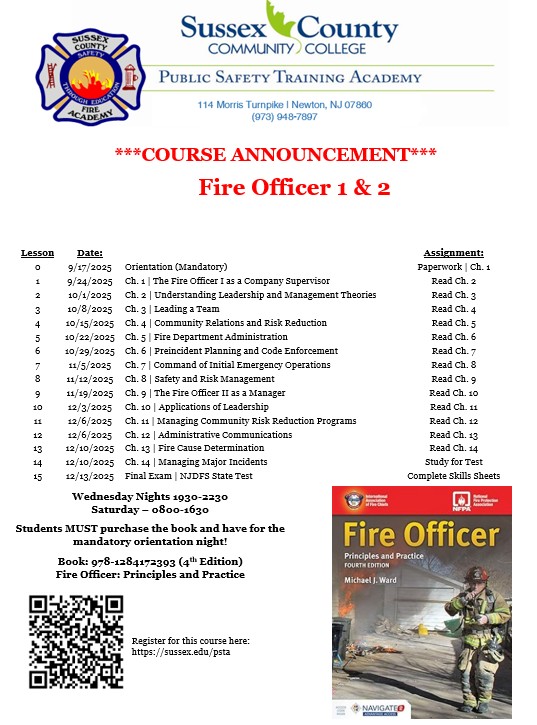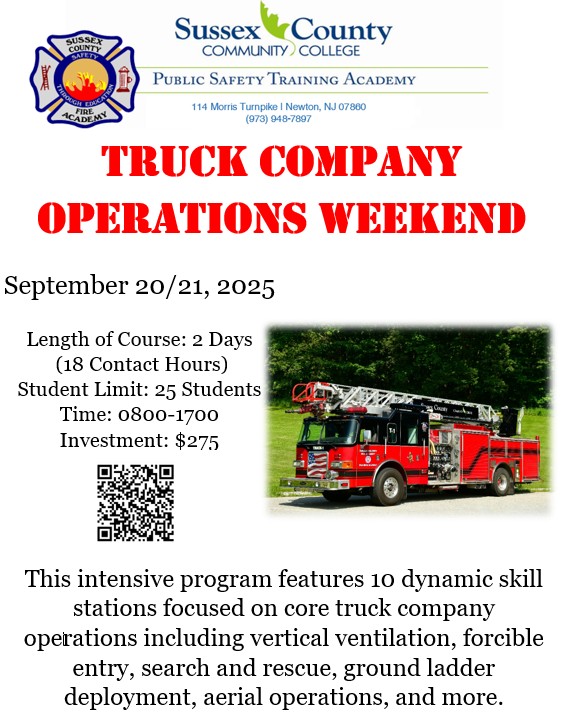The Public Safety Training Academy offers courses for firefighters. Please see the list of courses offered below and use the Registration Form for each course you will be attending.
Tuesday Night | Thursday Night | Saturday All Day
Course Start: 31 May 2025
***Mandatory Orientation Day 31 May 2025***
Course End: 18 November 2025 (if no weather delays)
1930 - 2230 Nights | 0800 - 1630 Days
Fee: $500 In-county | $750 Out-County
Firefighter 1 is the first level of a progressive program. This level introduces the novice firefighter to the basics of nationally recognized firefighting techniques. Methods of instruction will include classroom theory and skill-oriented "hands‑on" drill sessions. Student performance will be evaluated throughout the course, including quizzes, mid‑term, and final exams, both written and practical. The New Jersey Division of Fire Safety's standardized Firefighter 1 test is given as part of the final exam. Firefighter 1 meets the performance objectives of the NFPA standard 1001 and N.J.A.C. 5:73‑4.3 standard, allowing a firefighter to perform firefighting under direct supervision. All students will receive ICS, CPR, Hazardous Materials Awareness, and Operational Levels of Training as required by N.J.A.C. 5:75-6.1.
Firefighter 2 is the second level of a progression that includes Firefighter 1. Instruction at this level will be aimed at providing the student with the skills and knowledge necessary to function under general supervision. Students will learn advanced strategies and tactics in the following: IMS, Rapid Intervention, Extrication, Advanced Suppression, Advanced Search, VES, Rescue Task Force Awareness, and assisting Technical Rescue Crews, just to name a few.
*Mandatory Evaluation must be completed to satisfy NJDFS Job Performance Requirements*
Further instructions will be emailed upon registration.
Flashover is the stage of a fire at which all surfaces, gasses, and products of combustion are heated to their ignition temperature and flame breaks out almost at once within the compartment area. This course will teach you to develop a working definition of a flashover, understand the 3 phases of flashover development, identify the 5 signs of an impending flashover, identify factors that can influence the development of a flashover, associated tactics such as PPV and VES and give you the understanding of the benefits and limitations of our structural fire fighting gear. We will also cover firefighter survival techniques in the unfortunate event a flashover occurs.
Firefighters seldom have the opportunity to observe a fire as it goes through its life cycle and this course will provide all of this information and more.
***Please register as a Department. Individual registrations will not be honored at this time.

Coming Soon...


Required Documents:
Firefighter I (FF1) Certificate
Fit for Duty Letter from the Chief of Department (or designee) on Official Letterhead
Proof of SCBA Fit Test
All required documents must be emailed to Marilyn at mdalessio@sussex.edu PRIOR to the training event. Failure to provide these documents will result in your being unable to participate in the training.
Items to Bring on Training Day(s):
Full PPE (Personal Protective Equipment)
SCBA (Self-Contained Breathing Apparatus)
Two (2) SCBA Cylinders
If you have any questions or need further assistance, please do not hesitate to contact us.